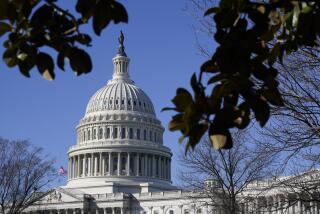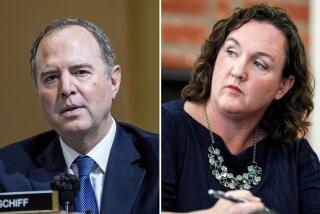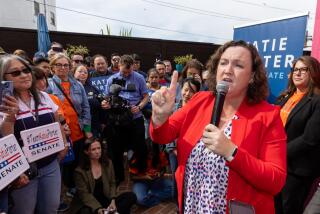The shadow campaign for the Democratic presidential nomination is well underway
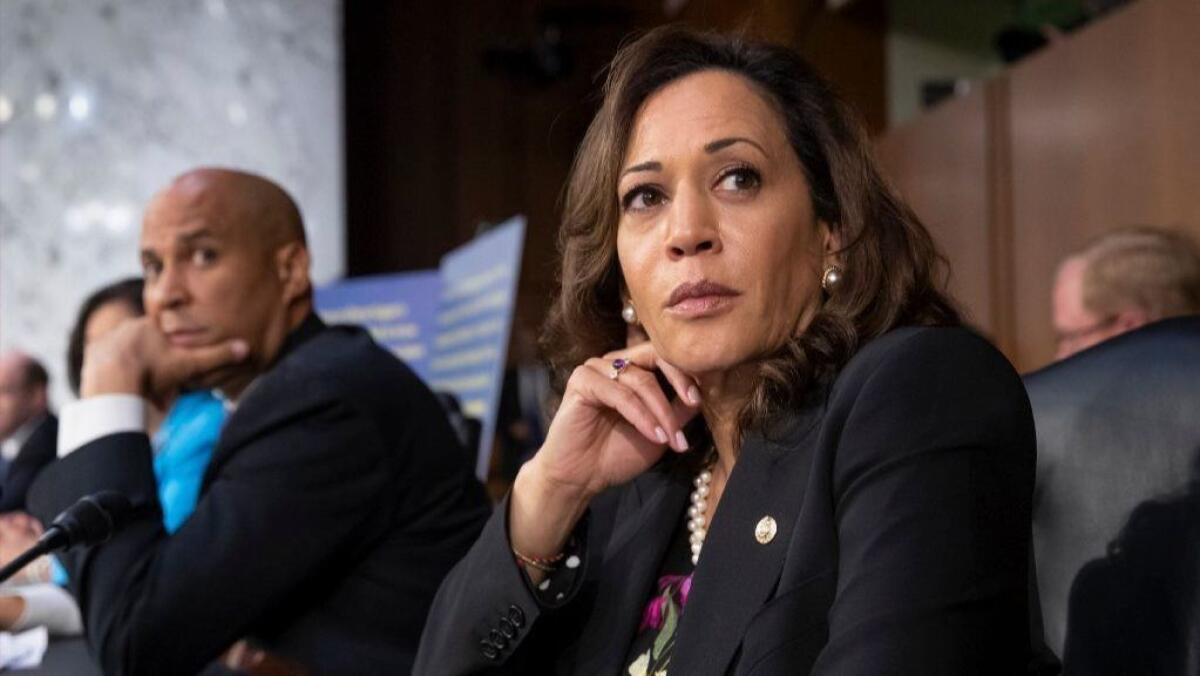
Eric Garcetti doesn’t carry the star power of political celebrities like Sens. Kamala Harris and Cory Booker when he heads out of state to test the waters of a presidential run, but he does have something else to offer: the financial firepower of Hollywood.
Late-night host Jimmy Kimmel, Dreamworks cofounder Jeffrey Katzenberg and others in the entertainment industry helped fuel a political action committee that the Los Angeles mayor used to boost the midterm treasuries of Democrats in states that hold key presidential primaries — and his own political fortunes along the way. The $100,000 that Garcetti’s committee sent to each of 11 state parties has earned him a lot of well-placed new friends outside Southern California.
He’s far from the only one raining love on Democratic Party organizations and office holders in states holding early primary contests.
The major hopefuls for the Democratic presidential nomination have yet to declare their candidacies. But that doesn’t mean they’ve been silent. Like Garcetti, the Democrats in waiting have spent the midterm election season ramping up in early-voting states, where the campaign has been underway for months.
“It’s different than we’ve seen before,” said Trav Robertson, chair of the South Carolina Democratic Party. “Usually the [presidential] candidates stay away from the midterms and don’t want to get involved. Not only did they come here … they all saw a need to invest here, and it paid off.”
The shadow campaign is already testing the wherewithal of the candidates, revealing what tools they plan to use to break out from the pack and which rivals each of the main hopefuls see as their early competition.
TODAY: Democrat Julian Castro takes first step toward 2020 White House run »
Already, a couple of would-be candidates have dropped out before the race began.
Los Angeles attorney Michael Avenatti catapulted into political fame representing porn actress Stormy Daniels in her case against President Trump. But he quickly took himself out of the running after the personal baggage that piled up around him — including an accusation of domestic abuse — suggested the vetting process was not going to be smooth.
Former Massachusetts Gov. Deval Patrick had a far less bumpy exploratory tour, which included a laudatory profile in the New Yorker. But he decided to get out before getting in, announcing on Facebook this month that “a 2020 campaign for president is not for me.”
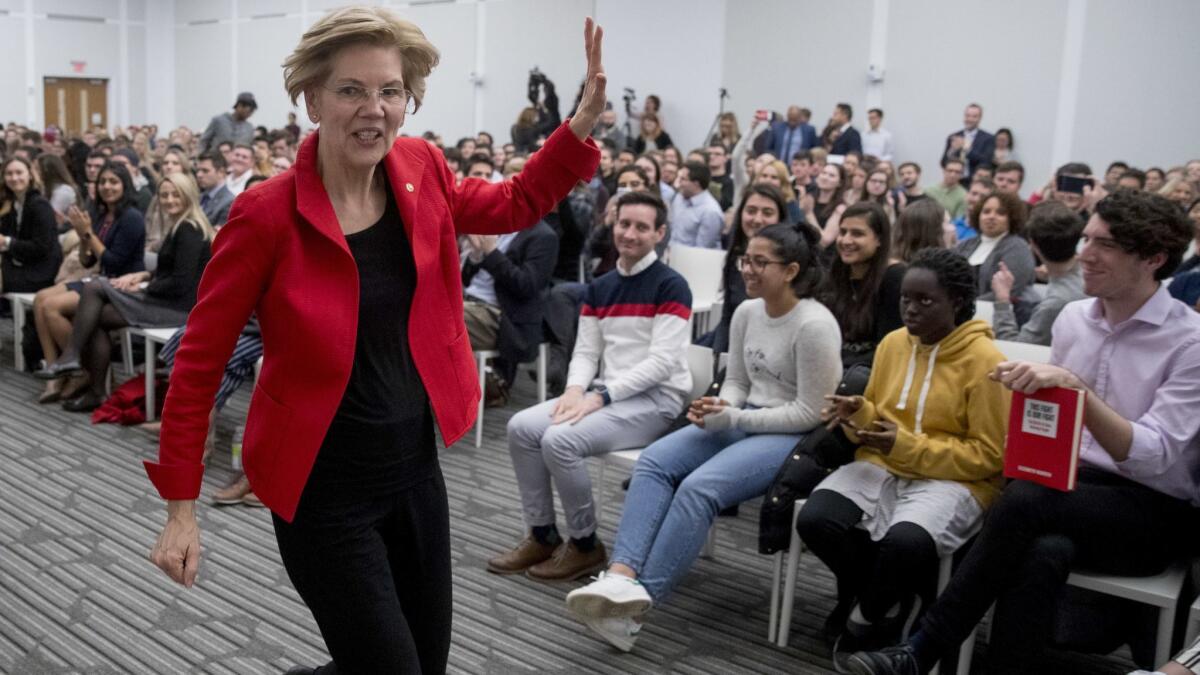
Others continue to play it coy, scoffing at the suggestion that a presidential run was even in the most remote recesses of their minds as they scrambled to ingratiate themselves with politicos in early-voting states, get on the rubber-chicken dinner circuits and lend their massive fundraising lists to local candidates who will be well positioned to help them.
They are also keeping careful matrices of the dollars they helped raise, each call they made and every chit they will be able to cash in should the time come. It’s a show of strength in a spreadsheet meant to make the case they are savvy, ready to fight and equipped to launch a durable presidential run.
Events so far have driven home with 2020 hopefuls the reality that digital savvy, a huge Instagram following and the latest tech gadgets alone won’t win them the nomination. They need to leverage those things to build an old-fashioned war chest and a network of relationships on the ground.
Sen. Elizabeth Warren (D-Mass.) has proven especially adept at doing that. Her fundraising juggernaut has spread its money and expertise across the nation, contributing and helping raise $11 million for other Democrats during the midterm election cycle.
She sent staff to work key races, surprised workers and volunteers toiling in far-flung local elections by hopping onto their strategy calls, and sent fundraising emails for 126 candidates. And she still has $12.5 million left in her campaign account, more than any other Democrat.
But Warren has taken a cautious approach to showing up. She stayed away from Iowa altogether during the midterm campaign, as expected candidates like her weighed whether such visits would be perceived as opportunistic. Her absence did not go over well with some activists in early-voting states, accustomed as they are to extensive early courting.
“It was puzzling,” said an influential Iowa operative who requested anonymity to speak candidly about the field. “It was sort of a sore thumb sticking out there. People are asking, ‘What is she waiting for?’”
Others considered to be in the top tier of the likely Democratic field were happy to fill the void. Booker (D-N.J.) took a four-day swing through the state, and a steady stream of social media videos and regular mentions of his Iowa family roots (the senator’s 99-year-old aunt still lives in Iowa) raised his profile considerably.
“People had been anxious about showing up because they thought it could look selfish,” said a person close to the senator. “But he went and was well received. Others realized they would be falling behind if they didn’t show up in what Iowans understood was the most important midterm in history.”
Two weeks later, Harris made the rounds in Iowa. California’s junior senator raised and donated $9 million to boost the fortunes of Democrats in races nationwide over the last year — a couple of million more than Booker, as people close to her like to note. Harris found time to lure 68,100 likes to her Instagram account by posting a photo of herself alongside the Harris family Thanksgiving turkey.
Both senators have touched down in a lot of states — Harris campaigned in a dozen and Booker in 24 — and drew big crowds. Booker regularly checked in with his half-million Instagram followers along the way.
Some of the most interesting early maneuvering so far has taken place in South Carolina, a state whose early primary is expected to loom much larger than in past contests.
African American voters make up the majority of the state’s Democratic primary electorate, positioning South Carolina as an early counterweight to the overwhelmingly white electorates in Iowa and New Hampshire, which have traditionally kicked off the primary season. Black candidates like Booker and Harris could be particularly well positioned in South Carolina, but the vote there could also be a test that only one of their candidacies survives.
On trips to the state that were heavily covered by local media, Booker spoke about racial injustice, the wealth gap between black and white and the struggles his father faced breaking free of poverty. Harris focused on the hearings into Trump’s Supreme Court nominee Brett M. Kavanaugh.
“What my hope was is that each of these candidates, by their engagement here so far, saw that the South Carolina primary will not be decided by a monolithic voting bloc to be taken for granted,” Robertson said. “We will not automatically go with one candidate like we saw in 2016” when Hillary Clinton overwhelmingly won the state’s vote.
Robertson had just had breakfast with Tom Steyer, the California billionaire and potential presidential contender who, like Michael R. Bloomberg, the billionaire former New York mayor, has made a big mark in early-voting states with his checkbook, buying goodwill among local power brokers and parachuting into states to get media exposure.
But the territory is filled with hazards even for billionaires. The agitated chairman of the Charleston Democratic Party called out Steyer on Twitter for failing to consult with the local group before rolling into the city for a town hall event perceived as a prelude to a Steyer presidential announcement. Bloomberg rattled the large editorial staff at the Bloomberg news service, which he owns, by suggesting off the cuff, during a radio interview in Iowa, that he might offload its entire politics team if he runs.
Others, like Silicon Valley Congressman Eric Swalwell, come with much smaller checkbooks. So they aim to compensate by showing up over and over. Swalwell recently returned from his 13th trip to Iowa this year.
In characteristic fashion, some Iowa activists who object that Warren has shown up too little complain that Swalwell has appeared too much. He’s such a constant presence that he’s replaced Maryland Gov. Martin O’Malley, who ran in 2016 and might again this time, as the punchline in loitering jokes.
“It’s a big state,” said Swalwell, an Iowa native. “Iowans expect to meet with you in person. If I am going to do this, I want to make sure we meet those expectations.”
More stories from Evan Halper »
evan.halper@latimes.com | Twitter: @evanhalper
More to Read
Get the L.A. Times Politics newsletter
Deeply reported insights into legislation, politics and policy from Sacramento, Washington and beyond. In your inbox three times per week.
You may occasionally receive promotional content from the Los Angeles Times.
